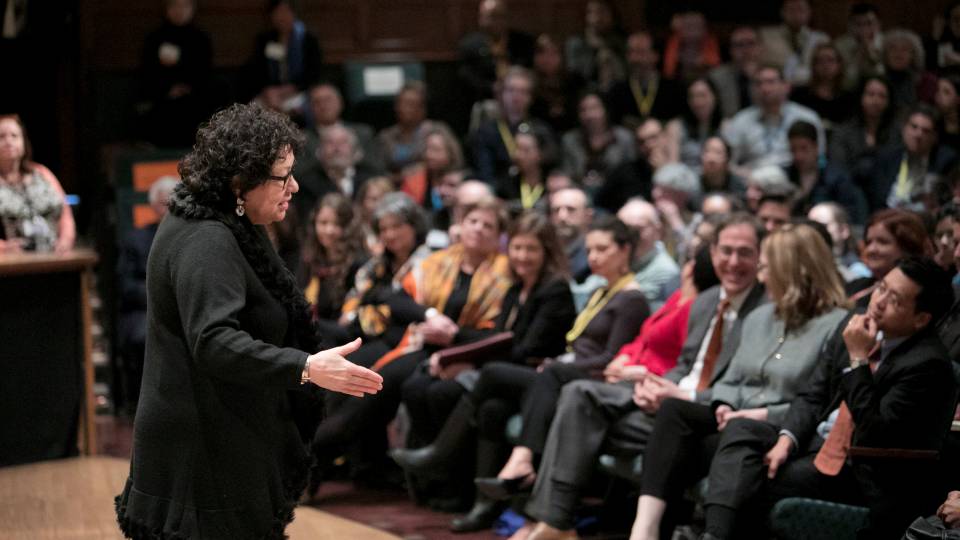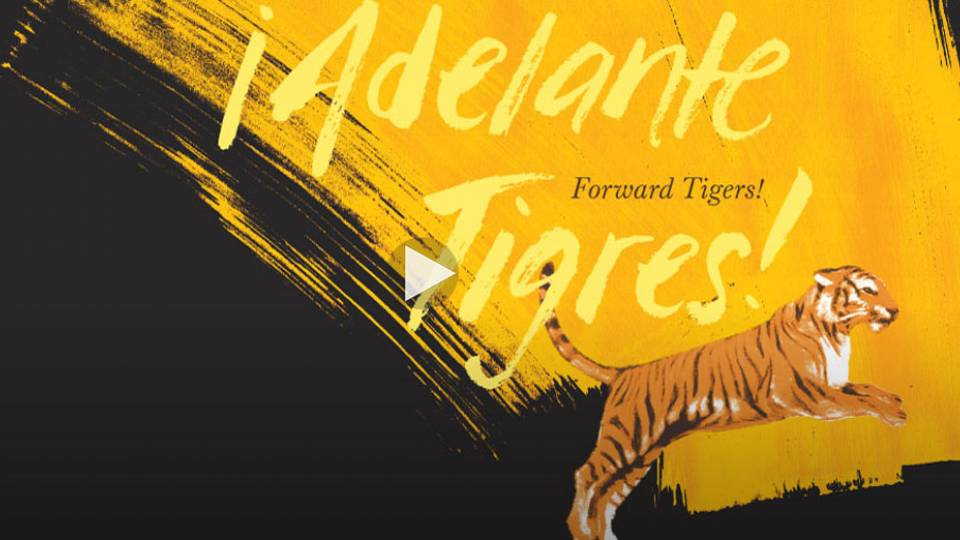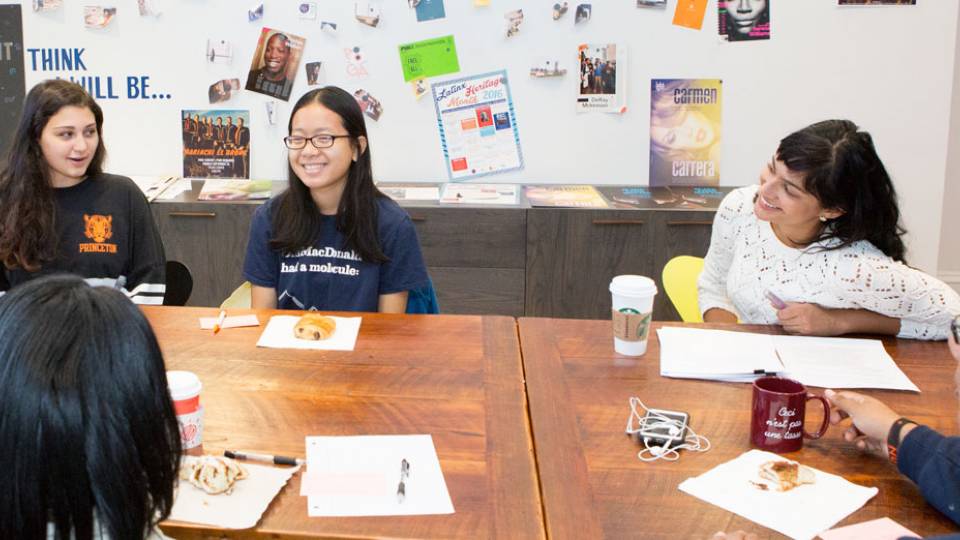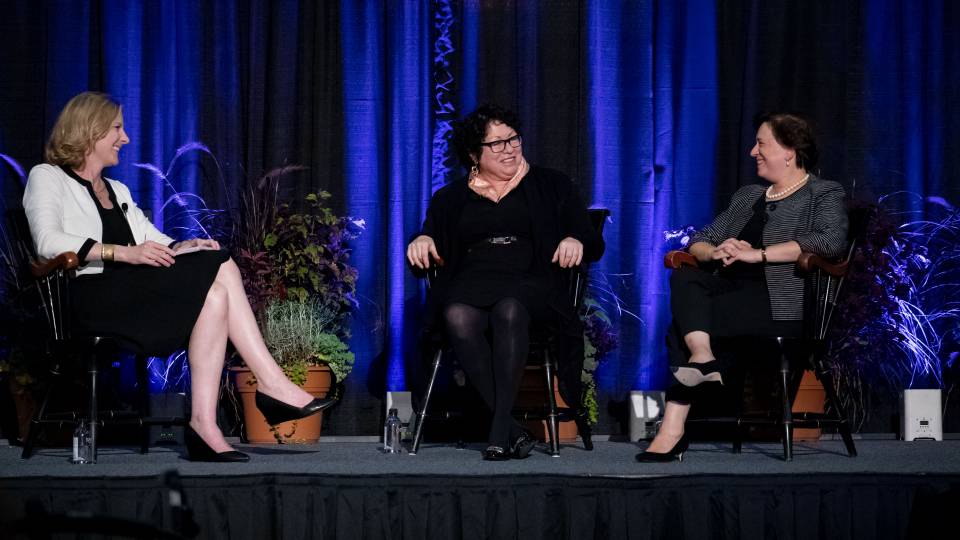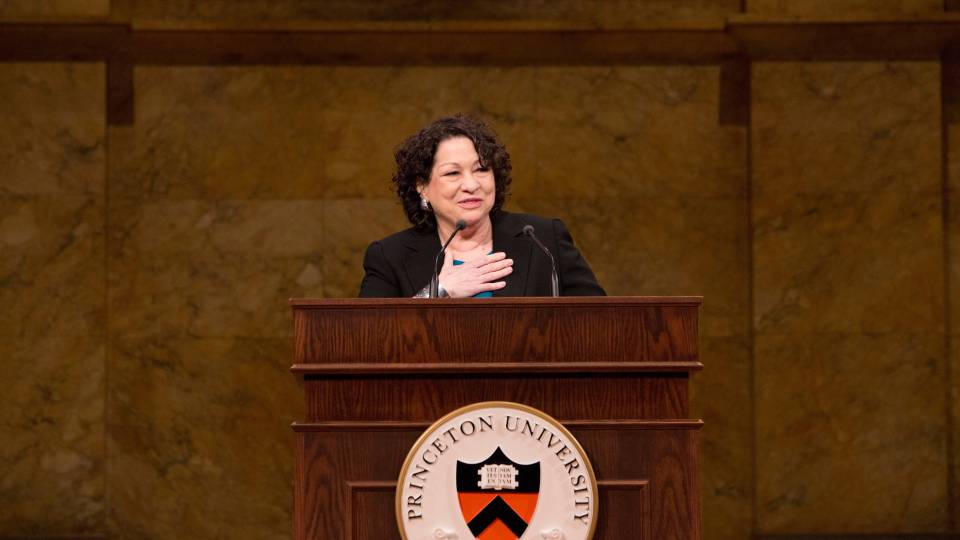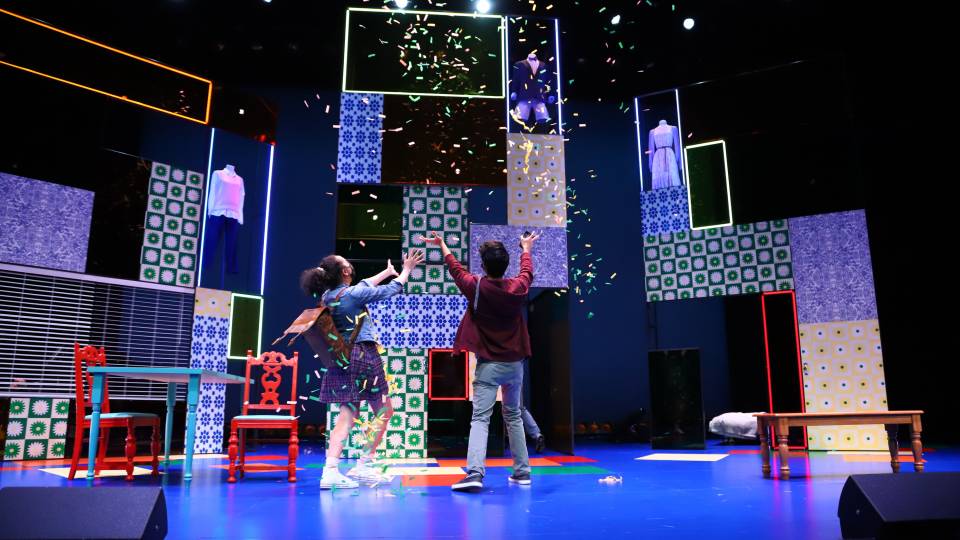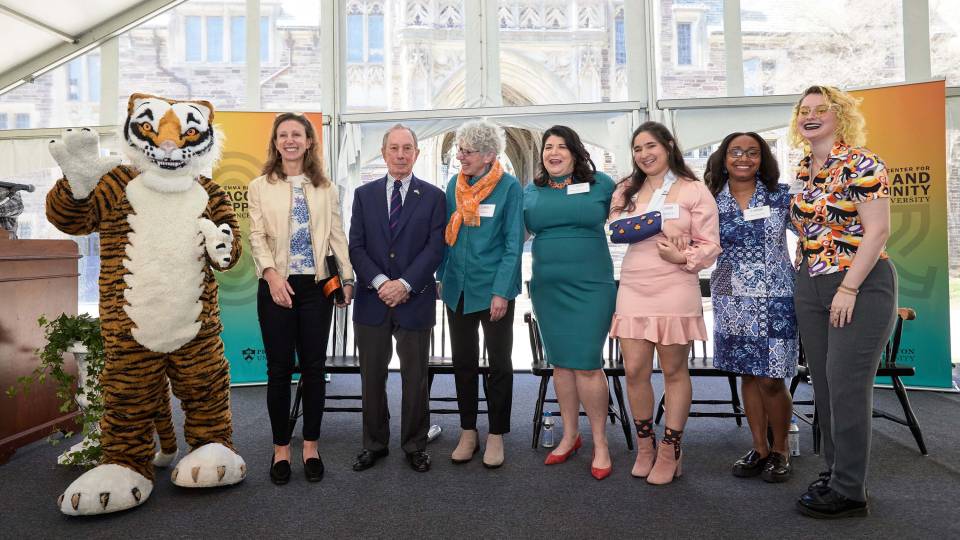Recalling their Princeton experiences and looking forward to new ones, more than 750 Princeton University undergraduate and graduate alumni and guests returned to campus March 30-April 1 for the alumni conference "¡Adelante Tigres! Celebrating Latino Alumni at Princeton University."
Alumni came from as far away as Uruguay, Austria and Britain, as well as from 25 states and Puerto Rico, for a weekend of discussions, lectures, performances, tours, and social and networking events, organized by the Office of Alumni Affairs. "¡Adelante Tigres!" was the first gathering of its kind for Princeton's Latino alumni. Attendees represented undergraduate and graduate classes ranging from the Class of 1951 to the Class of 2016.
In a packed Richardson Auditorium on Saturday afternoon, U.S. Supreme Court Justice Sonia Sotomayor, Class of 1976, said in a lively, laughter-filled conversation with her friend Margarita Rosa, Class of 1974 and a University trustee, that when she got to Princeton, "I did not know what I was doing."
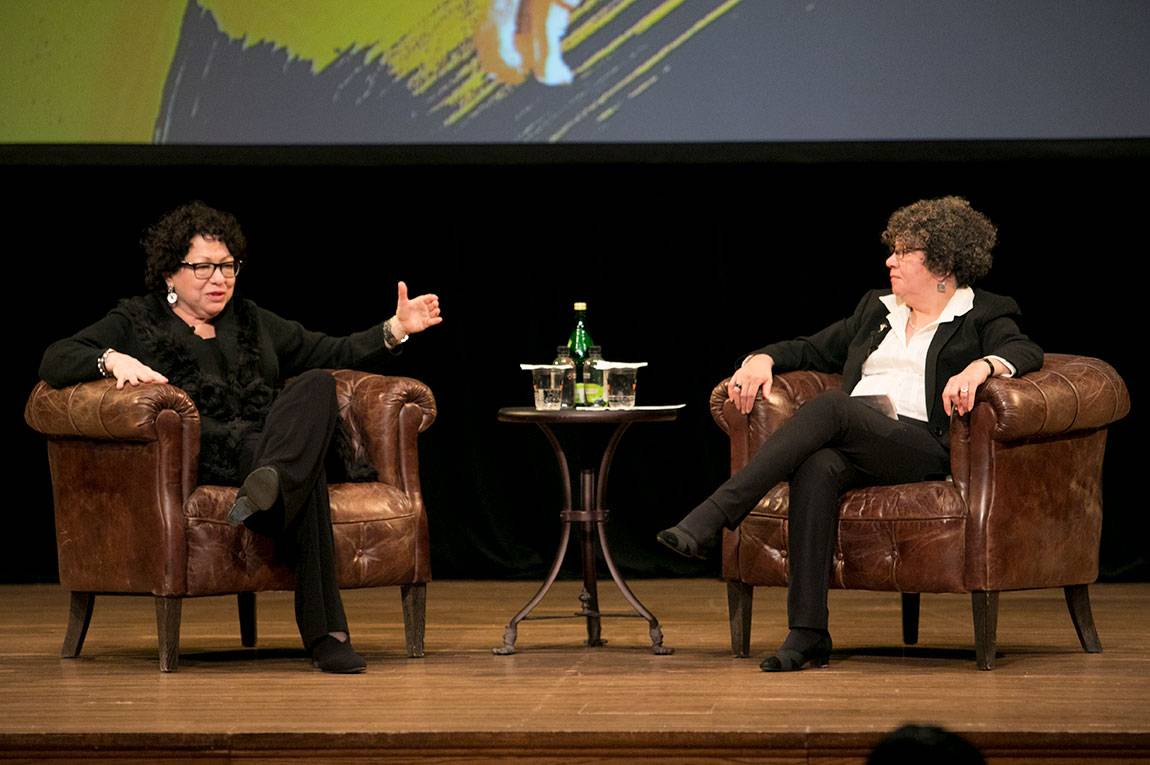
U.S. Supreme Court Justice Sonia Sotomayor (left), Class of 1976, answers questions from her friend Margarita Rosa, Class of 1974, about memories of Princeton and what it means to serve. Rosa is a University trustee and Sotomayor also has served in that role. (Photo by Denise Applewhite, Office of Communications)
Sotomayor, who also met with students in the morning, said that while Princeton at first felt very "alien" to her — a young woman of Puerto Rican heritage from public housing projects in the Bronx — she recognized the need to "get a lay of the land" before "jumping head first into the pool." She took some introductory courses to help her acclimate and gain confidence, and asked plenty of questions.
"What I learned to do at Princeton was ask questions," she said, such as 'Who's Alice in Wonderland?' when a classmate compared her to the character from a book she had never read.
"Someone once told me that ignorance is not being dumb," Sotomayor said. "And that's a lesson I think most people don't learn. Most of us confuse ignorance — not knowing something because we haven't been exposed to it — with being stupid. And because we equate the two, we don't figure out early on that the true dumbness in life is the unwillingness to admit ignorance. … We learn socially. We learn through common shared experience."
Throughout the conference Sotomayor, who also served as a University trustee, said she heard the stories of many alumni who had found success because someone had taken a special interest in them and helped them find their way. For her, Sotomayor said, that person was a debate coach in high school.
"For many of us it was a friend, a family member, an outsider — someone who saw something in us and guided us," Sotomayor said. "How many of us in this room are actively, every day looking for that life we're going to touch? Because all of us have been touched, we have a continuing obligation to ensure that we're actively seeking out those who need that."
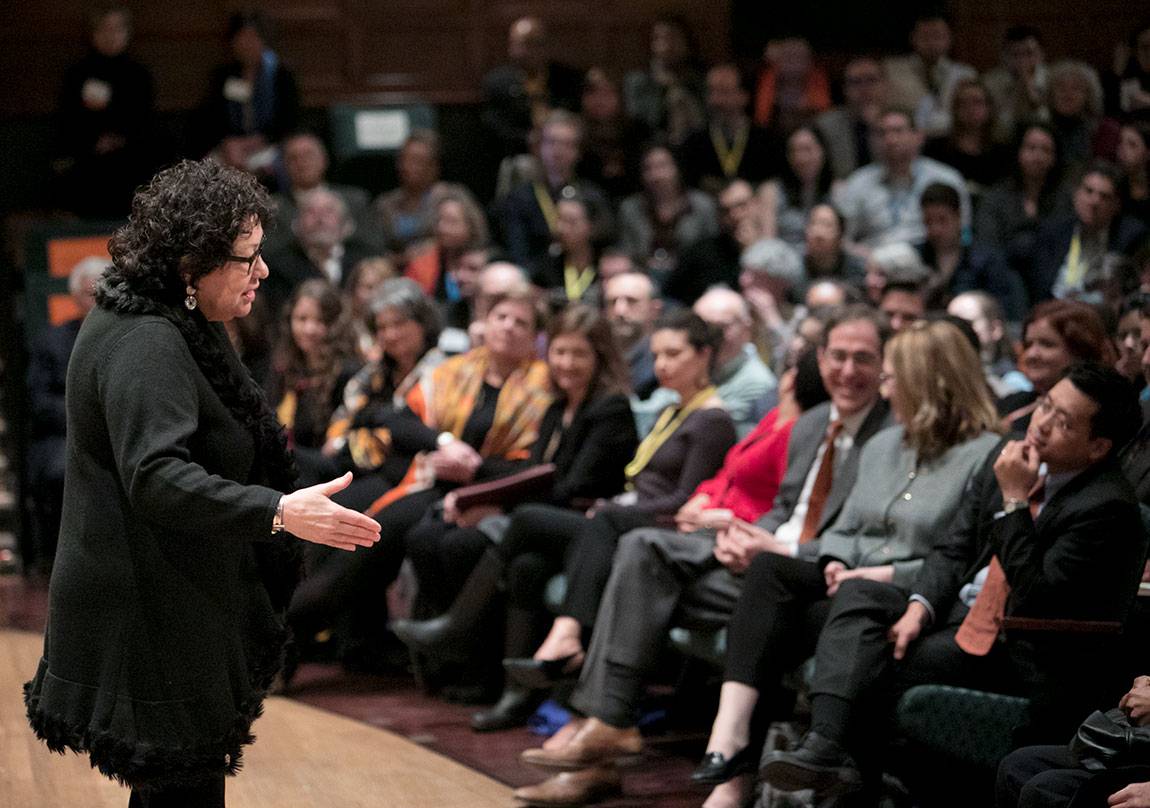
Sotomayor joins the audience after her conversation with Rosa, coming down from the stage to walk the aisles — greeting old friends and responding to queries about overcoming challenges in her life and what an aspiring lawyer should study. (Photo by Denise Applewhite, Office of Communications)
Rosa asked Sotomayor about the thinking behind her 2014 Alumni Day speech, which emphasized service to humanity and inspired the University's recast informal motto, "Princeton in the nation's service and the service of humanity." Sotomayor said she was reflecting on the commitment of her grandmother and her mother to help their family and community, as well as others who help people in their church, their neighborhood and beyond.
"Service to me meant — what my life I hope has meant — it's caring, it's giving," she said. "… If we start there, everything else good will follow. So, I don't care how you serve. I just want you to serve."
Sotomayor also took questions from the audience, coming down from the stage to walk the aisles — greeting old friends as she responded to queries about overcoming challenges in her life and what an aspiring lawyer should study. Each questioner got a photo with Sotomayor and a hug. When asked what she was proudest of, Sotomayor said, "That I've never walked alone."
"When you applaud for me it's like you're giving me a big hug," she said as the audience gave her a standing ovation.
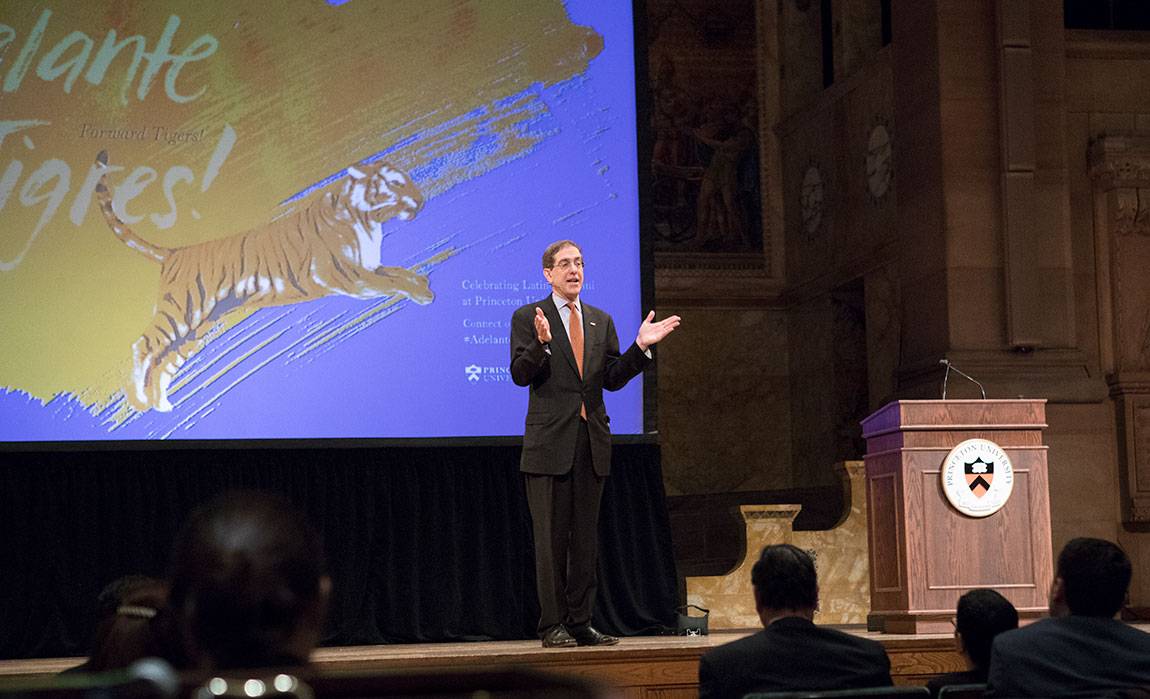
President Christopher L. Eisgruber greets alumni on Friday morning, outlining the University's vision and underscoring its commitment to diversity. (Photo by Denise Applewhite, Office of Communications)
Commitment to a diverse community
In his welcome to alumni in Richardson Auditorium on Friday morning, President Christopher L. Eisgruber said Princeton is special because of its long-term investments in its faculty and students, such as Sotomayor.
"What this University did is bring a young girl from the Bronx to our campus and let her follow her passions here," he said. "We believed that 25 or 35 years down the road from the time she graduated, she could be a leader. Because of the education she got here, because of the transformation that she effected here and because of the friendships that she formed with some of you, [we believed] she could be a leader with regard to problems and challenges that we could not even envision at the time when she was an undergraduate."
Eisgruber outlined the University's vision for the future. He focused on three strategic priorities to sustain and build on Princeton's excellence: being a great liberal arts university in the 21st century; increasing access to a Princeton education by admitting more students from first-generation and low-income backgrounds; and emphasizing service as central to the University's mission.
Eisgruber called the increasing socioeconomic diversity of undergraduates "one of the biggest social transformations that has taken place on this campus since coeducation." This year's freshman class (Class of 2020) includes 21 percent who are eligible for federal Pell Grants for low-income students and 15 percent who are among the first in their families to attend college.
"This campus is becoming more diverse in many different ways, and is creating an experience for students that continues to be transformative and helps them cope with the many different challenges they will face as they move forward," Eisgruber said.
Princeton has a generous financial aid program that allows students to graduate debt free, and Eisgruber said the University must attract more students who benefit the most from such resources.
"Princeton is extraordinarily affordable," he said, adding that 60 percent of all undergraduates receive financial aid. "But we need to do more to attract students from less well-off backgrounds. … We know from social science research that when you bring students to a four-year college campus and get them a degree, that it is the best thing you can do if you want to achieve socioeconomic mobility in this country. … The chances of graduating and making a difference in life are the highest if [lower-income] students come to a place like Princeton."
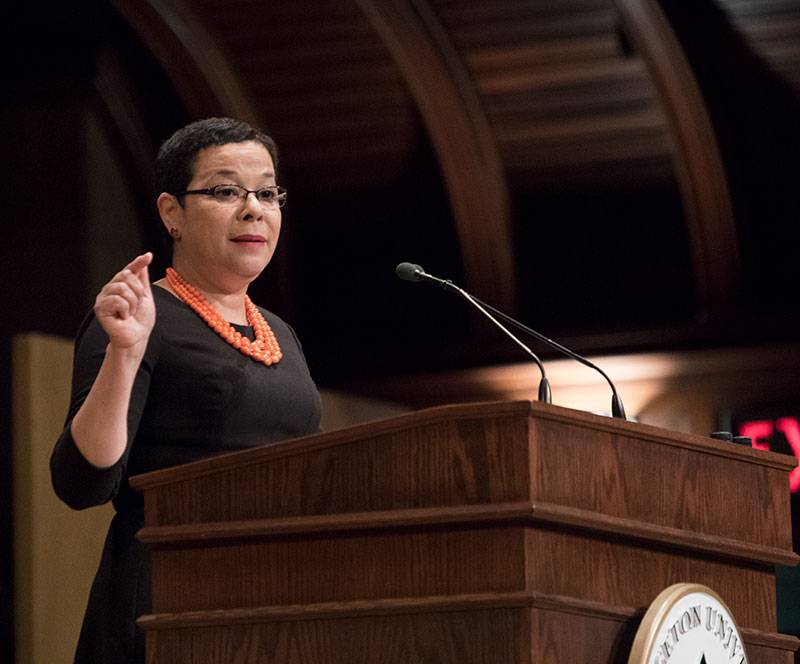
Ramona Romero, the University's general counsel, shares some her of personal history as a "proud immigrant of the Dominican Republic" and how she came to work at Princeton. (Photo by Denise Applewhite, Office of Communications)
Eisgruber was introduced by Ramona Romero, the University's general counsel. She joined the University in 2014 after serving as general counsel of the U.S. Department of Agriculture. She is a former president of the Hispanic National Bar Association.
Romero shared some of her personal history as a "proud immigrant of the Dominican Republic" and how she came to work at Princeton.
"As I considered whether to join the Princeton family, I wondered whether I would feel at home," Ramona recalled. "As a Latina lawyer, I have been the first one and the only one in more settings than I cared to count. Luckily for me I came to believe that Princeton was a place I could call home. And experience has proven me right."
Romero credited the advocacy of Latino alumni for helping make Princeton a home for a diverse range of students.
"It is a credit to the work you have done as students and alumni. When you have demanded changes that have resulted in a significant increase in Latino students, faculty, staff, and also a profound change in attitude," she said. "With your encouragement, this University has traveled forward a long distance in the last 40 years."
As examples of progress, Romero noted that 43 percent of undergraduates today identify as Americans of color and 9.5 percent as Latino. She said the University's administration has spoken loudly against proposals that could "bring harm to minority groups," citing Princeton's leadership in opposing President Donald Trump's executive orders on immigration. She also noted the University's continued support for immigrant students with Deferred Action for Childhood Arrivals (DACA) status.
"I see firsthand each and every day the University's commitment to make this community ever more diverse and ever more welcoming to those of us of different heritages," Romero said.
Romero's remarks were followed by the premiere of the conference video highlighting the history and experiences of Latino students and alumni at Princeton from the 1800s to today.
Sharing stories of personal and professional successes
On Thursday night, José Quiñonez, a 1998 graduate alumnus, kicked off the conference with the talk "Out of the Shadows: My American Story." Quiñonez has a master's in public affairs from the Woodrow Wilson School of Public and International Affairs.
He talked about leading the Mission Asset Fund, for which he was awarded a 2016 MacArthur Fellowship. The fund helps low-income immigrants formalize their financial practices and build credit so they can find financial stability. He said his organization was inspired by economic ideas he learned at Princeton.
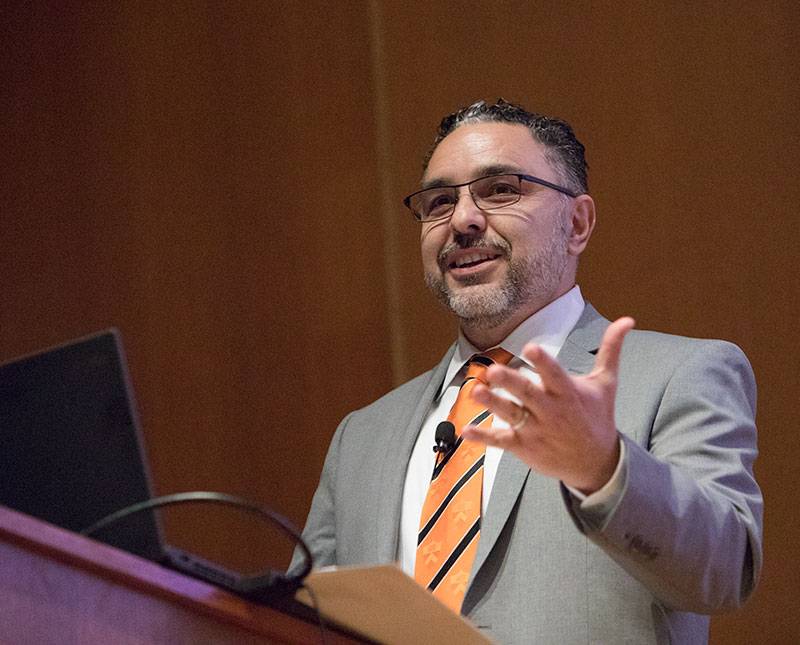
José Quiñonez, a 1998 graduate alumnus, talks about crossing the border from Mexico to California as a child in "Out of the Shadows: My American Story," one of several alumni presentations during the conference. (Photo by Denise Applewhite, Office of Communications)
Quiñonez also talked about how he crossed the border from Mexico to California when he was 9 years old. He and his siblings made the dangerous journey in the darkness of night following the deaths of his parents. When they arrived in the United States, his siblings were split up to live among distant relatives.
"Outside of home, the fear of getting caught and deported permeated for years," he said. "In school we kept quiet and never reached out for help. We had to make ourselves small and invisible just to survive."
His life in the U.S. improved following two milestones: when his 18-year-old sister rented a small apartment so the siblings could live together, and when President Ronald Reagan signed the Immigration Reform and Control Act of 1986.
"The amnesty law allowed immigrants like my family to emerge from the shadows. We got green cards. We got permission to work; to exist," Quiñonez said. "I got a Social Security number. I opened a bank account. I qualified for student loans for college. I became a U.S. citizen. I would not be able to stand here today if I didn't get amnesty in 1986. Amnesty unleashed my human potential to be what I am today."
Quiñonez said his story exemplifies how you can help improve lives through understanding of others.
"The world is getting even more complex. When you embrace that complexity you can find those nuggets of truth. It is those truths that you can use to solve complicated social problems," Quiñonez said. "That is how I saw my family's journey — the complexity, the pain, the hurt. Instead of hiding from it, it's about embracing it and using that to find empathy and connections with others. Through that connection, you can build a better world for our future and for ourselves."
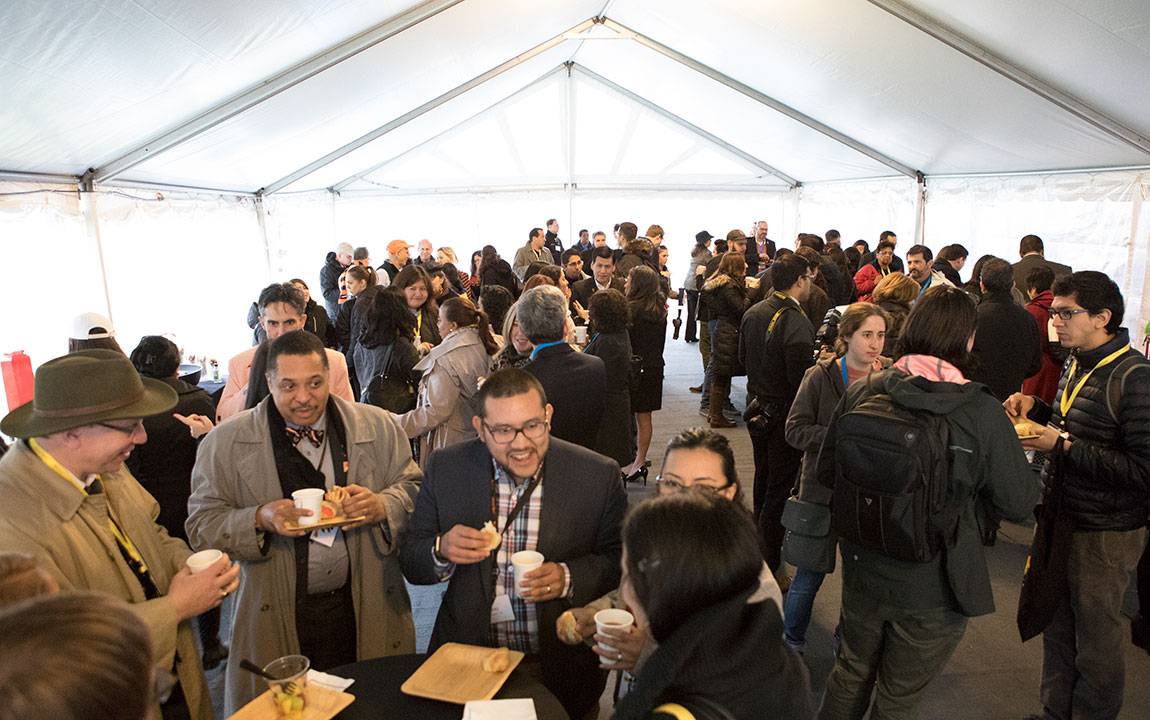
Alumni take a moment in between alumni and faculty panels, networking events, arts performances, and more to indulge in mercado-style fare at one of several receptions and cafecitos held in tents around campus. (Photo by Denise Applewhite, Office of Communications)
Celebrating with hugs and 'holas'
Alumni gathered at a variety of events, including a performing arts showcase, themed food events, a salsa and bachata dance workshop, film screenings and exhibitions across campus where friends reconnected and alumni from all classes mingled. A closing reception and dinner included remarks by Nellie Gorbea, Class of 1988, secretary of state of Rhode Island.
The conference began Thursday night with a mercado-style welcome reception in Chancellor Green Rotunda featuring a variety of Latin flavors, such as arepas stuffed with corn and cheese, ceviche, chorizo, quinoa and orange salad, and mojitos. Alumni greeted each other with hugs and holas as they reunited with classmates who had come from across the country and world.
Alicia Miñana, Class of 1984, arrived from Los Angeles. "I say this conference is about time! We needed something like this!"
Emelda Medrano, Class of 1987, laughed with her sister Christy Medrano McKellips, Class of 1993. "It's a family reunion and a Princeton reunion!" said the sisters.
"I think this conference is validating," said Deborah Compte, a 1980 graduate alumnus. "It's so wonderful to recognize how many alumni are here."
At the "Churros, Buñuelos & Sopapillas: Undergraduate and Graduate Student and Alumni Social" on Saturday, Ana Alvarez, Class of 2012, connected with friends. Alvarez and her two younger brothers, Cesar, Class of 2013, and Jose, Class of 2015, were first-generation students whose parents emigrated from Mexico when the children were very young. During Ana's senior year, the three siblings — all of whom were able to attend Princeton because of its generous financial aid program — were together on campus. (Watch a video about their undergraduate experience.)
Ana Alvarez said: "I was particularly excited to see the Honorable Sonia Sotomayor. It was more than I expected, seeing her a few feet away from me in the group photo [at Blair Arch] and then seeming extremely human while talking to the rest of us in Richardson Auditorium. It was a great experience and huge inspiration."
Isabel Ramirez, Class of 2010, echoed the sentiment. "She's [Sotomayor's] my hero," Ramirez said. "I'm really inspired by how hard-working she is and I can relate to her story. Justice Sotomayor's mother actually grew up in the same Puerto Rican town where my grandparents are from."
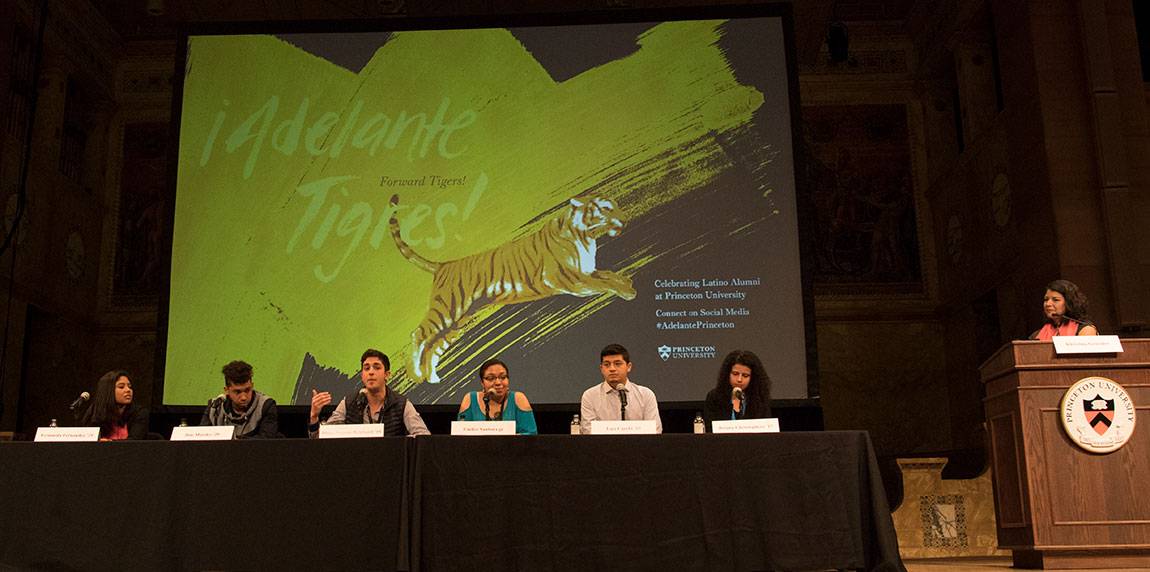
Khristina Gonzalez (far right), associate dean and director of the Freshman Scholars Institute, moderates a candid conversation with undergraduate and graduate students about topics ranging from acclimating as a new student to building a Latino community during the panel "The Student Experience Today." From left: Sophomore Fernanda Fernandez, first-year student José Morales, junior Diego Negron-Reichard, graduate student Emilce Santana, sophomore Luis Carchi and senior Briana Christophers. (Photo by Danielle Alio, Office of Communications)
Student voices: Creating a more diverse Princeton
Khristina Gonzalez, associate dean and director of the Freshman Scholars Institute (FSI), moderated the panel "The Student Experience Today." FSI is a summer program that immerses select students, including many low-income and first-generation students, in academic life prior to the beginning of the fall semester.
Five undergraduates and one graduate student engaged in a candid conversation on topics ranging from acclimating as a new student to building a Latino community.
Gonzalez, who also supervises the Scholars Institute Fellows Program (SIFP) — which allows FSI participants to continue to be part of the vibrant scholarly community for their four years at Princeton — started by asking, "What has made you joyful?"
Briana Christophers, a member of the Class of 2017 who is majoring in molecular biology, said: "What has been really positive is getting involved in research as early as possible. I pushed myself to see myself as a scientist." Christophers did not have the opportunity to participate in FSI but is a head fellow for SIFP. She told the audience that SIFP "drastically changed my Princeton experience," as she did not have a way to connect with the first-generation/low-income community prior to her junior year. She was then inspired to start Project Welcome Mat, a resource for first-generation and low-income students.
Junior Diego Negron-Reichard, who is majoring in the Woodrow Wilson School and is a co-founder of Princeton Advocates for Justice, said "Princeton dares us to go beyond our comfort zones."
Sophomore Fernanda Fernandez, an FSI scholar and a molecular biology major, said she is grateful for faculty mentors. "I'm a pre-med student but my advisers have pushed me to take other classes I wouldn't have envisioned myself taking."
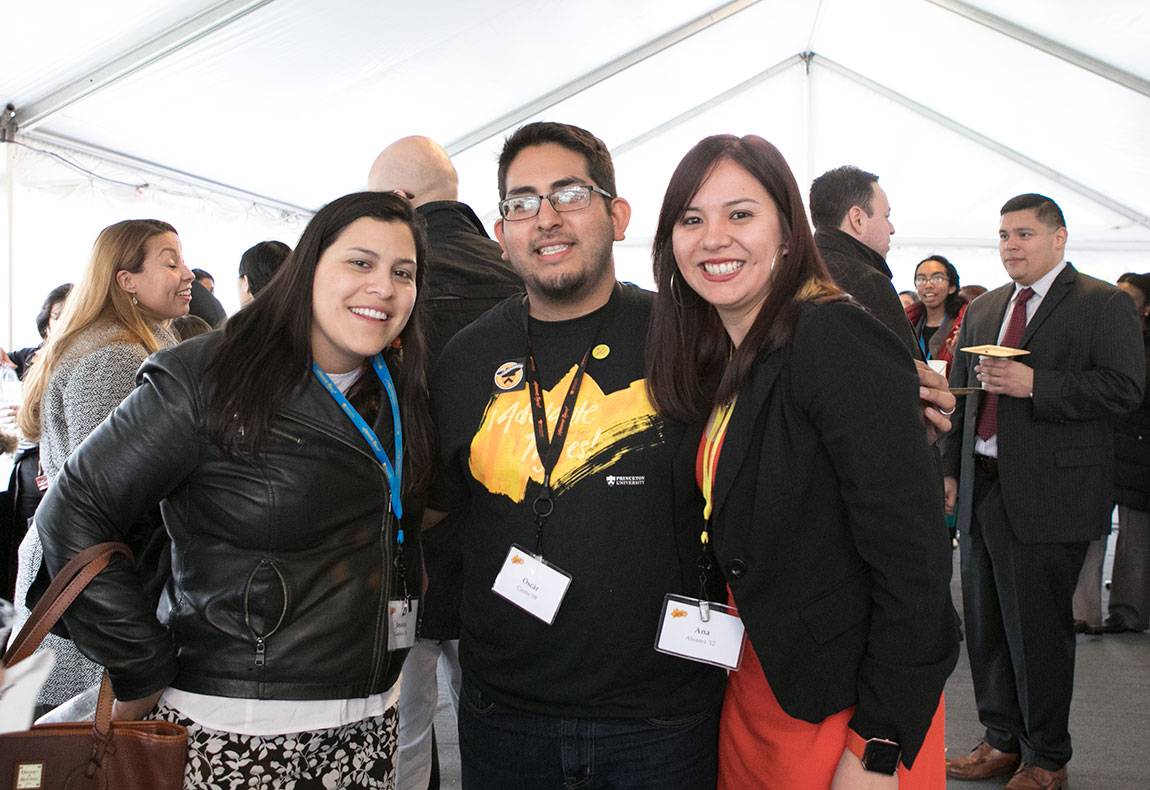
Jessica Gamboa, a 2010 alumna (left); Oscar Castro, a member of the Class of 2009; and Ana Alvarez, a 2012 alumna, enjoy the "Churros, Buñuelos & Sopapillas: Undergraduate and Graduate Student and Alumni Social," one of several food-themed events at the conference. (Photo by Denise Applewhite, Office of Communications)
Gonzalez asked, "What's been difficult for you here and what are the ways you've worked through those challenges?"
Emilce Santana, a graduate student and a diversity fellow with the Graduate School who grew up in the Bronx, said when she arrived on campus she felt that graduate students were perceived as "the backup singers" to the undergraduates and she missed the hubbub of the city. "Now I see the quiet as a friend," she said. Santana has also found a welcome sense of camaraderie at the Latino Graduate Student Association weekly dinners. "We just chill and eat. It's brought us together more than any other type of event could. I've gotten to meet people I never thought I ever would have met."
Christophers, who is from Miami, said: "I'm the only Latina in my year in molecular biology and there are very few faculty of color. It's hard when you don't even see someone remotely like you in the classroom." However, she said that getting involved in building a Latino community at Princeton has been very rewarding. "It's a labor of love, planning events and advocating on behalf of our community."
In response to Gonzales' question about how language and the politics of language have shaped their experience at Princeton, first-year student and FSI scholar José Morales said: "I'm from Miami, I'm used to hearing Spanish all the time. Once I heard it [on campus], I said,' I gotta find out who that is!'"
Concluding the discussion, Gonzalez asked, "How can alumni be helpful?"
Sophomore Luis Carchi looked out into the packed seats in Richardson Auditorium and said with a grin: "I'm so excited because all of you are in the same room! It was so difficult to find you guys online. There's only so many names you can look up on TigerNet. I wish there was a readily accessible network like a LinkedIn Princeton Latino group with names and pictures."
During Q&A with the audience, Ricardo DeLeon, a member of the Class of 1986 and president of Association of Latino Princeton Alumni (ALPA), stood up and said to the student panelists: "Stay in contact with us. Keep the communication going. We do have a Facebook page. We want you to know we're here."
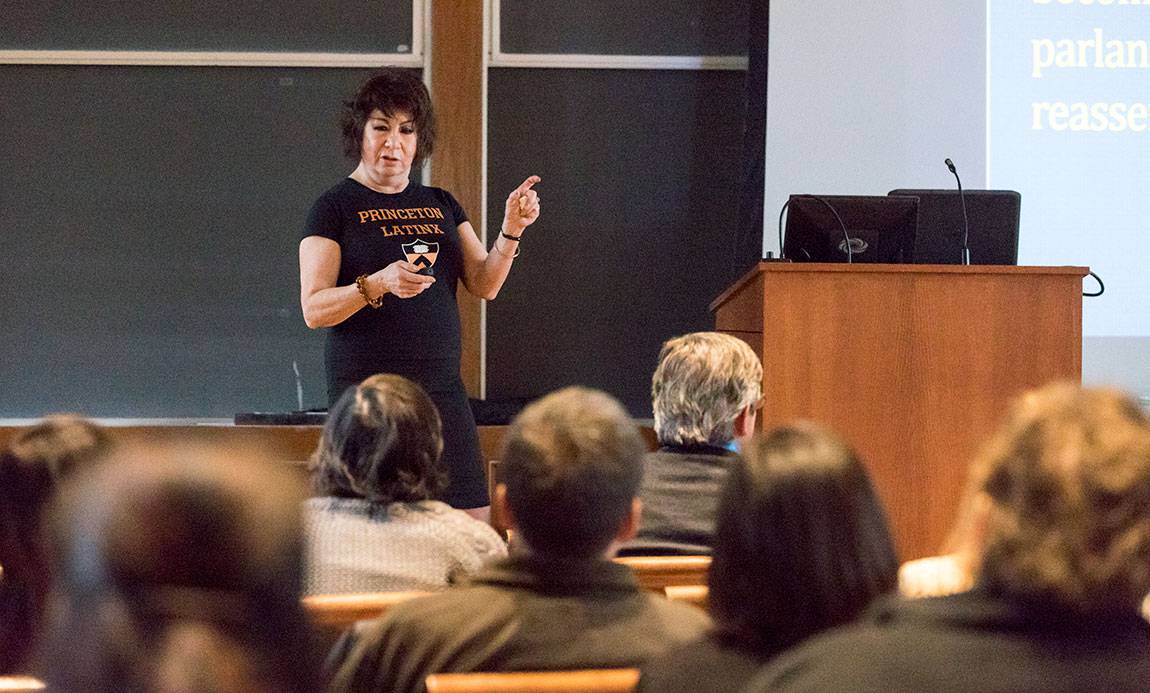
In her talk, "Latino, Latina, Latinx: Immigration and Identity in the Age of Globalization," Patricia Fernández-Kelly, professor of sociology, explains why "language matters mightily" when considering the history behind the various terms used to describe the diverse Latino community. (Photo by Nick Donnoli, Office of Communications)
Going 'back to class' with faculty and alumni discussions
Conference lectures and panels showed the influence of Latino alumni in fields ranging from business, law, journalism, the arts, media, education and more. Alumni speakers and panelists included José Alvarez, Class of 1985, senior lecturer at Harvard Business School; Eduardo Bhatia, Class of 1986, former president and minority leader, Senate of Puerto Rico; Marta Hernanz-Schulman, Class of 1973, radiology vice chair for pediatrics, Children's Hospital at Vanderbilt; Lisette Nieves, a 2010 graduate alumna, White House Commission on Educational Excellence for Hispanics; Anthony Romero, Class of 1987, executive director, American Civil Liberties Union; and Anilu Vazquez-Ubarri, Class of 1998, chief diversity officer and global head of talent, Goldman Sachs; among others.
Patricia Fernández-Kelly, professor of sociology, opened her talk, "Latino, Latina, Latinx: Immigration and Identity in the Age of Globalization" by noting, "Language matters mightily in struggles for social representation and equal participation."
Unpacking the history of the words "Hispanic" and "Latino," Fernandez-Kelly said: "Both terms create the false impressions of uniformity where none exists. The 50-55 million Latinos [in the U.S.] include people from more than 20 countries and territories — most of them have been here for long periods of time. They see themselves as part of the American dream."
Noting the debate around the word "Latinx" — a term that emerged in 2014 as a way to include gender-nonconforming people of Latin American descent — she said it is helpful to "allow many voices, many words, [to] be heard in respectful, caring ways. Let trust prevail as we go forth in the spirit of recognition and mutual appreciation for all these voices, all these identities, all these ways of being in the world. We must fight to not let the term become a racial term, because that's what's happening right now."
Also on the conference agenda were lectures by Princeton faculty members Brian Herrera, assistant professor of theater in the Lewis Center for the Arts; Ali Valenzuela, assistant professor of politics; Miguel Centeno, the Musgrave Professor of Sociology; and Mónica Ponce de León, dean, School of Architecture.
The Alumni Association website includes more "¡Adelante Tigres!" conference photo, video and social media highlights, including a Facebook gallery and a Storify recap of the conference.
Emily Aronson, Karin Dienst, Michael Hotchkiss and Jamie Saxon contributed to this story.
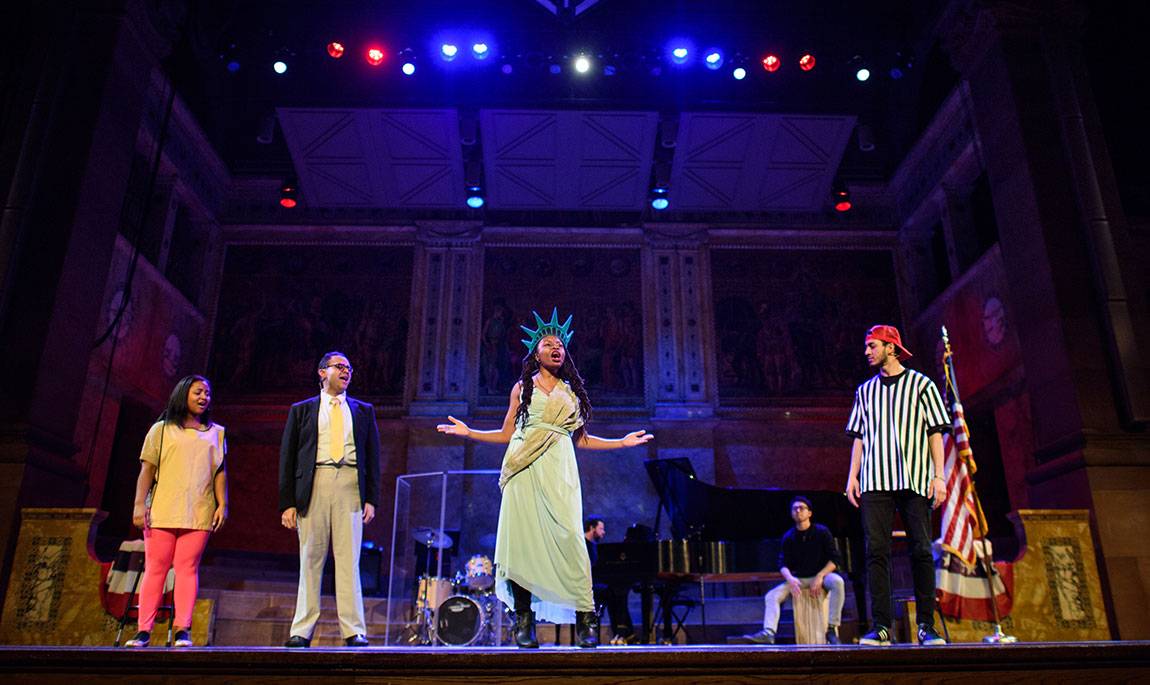
Students and alumni perform in an arts showcase on Friday night, with selections from "Manuel vs. the Statue of Liberty," an original work by graduate alumna Noemi de la Puente. (Photo by Sameer A. Khan/Fotobuddy)
